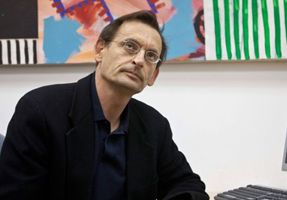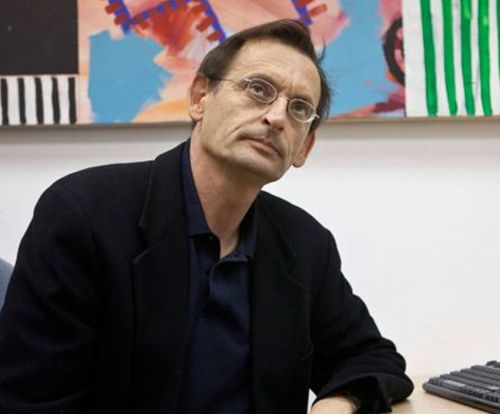
In the eve of the Knesset elections, Hadash MK Dov Khenin answers Haaretz readers’ questions in real time on Wednesday about chances of joining the next government, the situation in Syria and the two-state solution. Haaretz readers were given the opportunity to ask MK Khenin about his political positions, individual rights, the social protest and the environment.
Question: I’ve understood from good friends of mine from the Arab sector, who I trust, that Hadash communicates different positions to the Arab audience than to the Jewish sector. For example, Hadash has openly supported (Syria’s) Assad. Is this true? Could you elaborate on Hadash’s position regarding the situation in Syria? And could you say if and how Hadash is working toward gender equality in the Arab sector?
Answer: Hadash does not support the Assad regime. We didn’t support Assad in the past either, and from the first day of the democratic protest in Syria we’ve supported the Syrian people’s demand for democratic change. We oppose the Assad regime. We’ve said explicitly that a regime that slaughters its own people cannot call itself developed or national. At the same time, we also oppose Al-Qaida and the Muslim Brotherhood who are fighting Assad not because he is a dictator, but because he is secular. We know that Saudi Arabia, Qatar, Turkey and Western countries are involved in this conflict and siding with the Muslim Brotherhood not out of real concern for democracy but because of their economic and imperial aspirations and interests. The concern that Hadash is speaking in two languages is facilitated by fears that exist in the public. We do speak in two languages, Hebrew and Arabic, but there is no difference in terms of substance.

MK Khenin answers Haaretz readers’ questions on Wednesday (Photo: Haaretz)
Q. If (Labor’s) Shelly Yacimovich forms the next government, do you see your party in the coalition?
A. We will do everything to bring down the Netanyahu government. This government is dangerous for Israel. This government has led to serious economic disparities and is planning a dangerous anti-social budget. This government terminated the political process with the Palestinians and is rapidly constructing settlements. If there is a chance of forming a different government we will do everything for that to happen. We are not asking to join a centrist government. We will be willing to support it from the outside in the manner that allowed Rabin to pass the Oslo Accords. For Netanyahu not to return to power two conditions need to be met: First, the number of people from the left who come out and vote has to increase, especially among the young, and numbers also need to increase among the Arab public in order to reach a scenario where there are less than sixty right-wing supporters in the Knesset. The second condition is that the centrist parties agree to treat the Arab citizens as citizens whose vote is truly legitimate and taken into consideration. We are committed to oppose Netanyahu, even if he forms the next government.
Q. Do you think it is better to have a right-wing coalition comprised of the Likud, Shas, Bayit Yehudi and others, or should centrist parties like Yesh Atid join it in order to make it more moderate?
A. Centrist parties would not make the government more moderate, it will only whitewash a dangerous policy politically and a destructive one socially. I call on the centrist parties not to repeat such a scenario.
Q. There has been criticism of your fellow party members, saying they are often absent from the Knesset and that they have hardly passed any laws or bills. Who are the Hadash members who are not Dov Khenin? Why don’t we hear about them or from them? Is there any truth to the claim that in Hebrew, Hadash speaks in a moderate and unifying language, and in Arabic it is more nationalistic and extreme?
A. I am proud of my fellow party members. They are on the ground a lot, accompanying social struggles and activities both in the Jewish and in the Arab public. Hadash leader MK Mohammed Barake won much praise as the chairman of the Knesset Committee on Drug Abuse. Number 2 MK Hana Sweid joined me in fighting Netanyahu’s anti-democratic, anti-social land reform. MK Afu Aghbaria, a doctor and resident of Um al-Fahem led the struggle to build emergency rooms in his city. These are three things you haven’t heard about. The Arab MKs represents a public which is discriminated against, and is not covered in the media. This is hard work and they do it with great devotion.
Q. What about women on the Hadash ticket in realistic slots?
A. Personally, I supported guaranteed slots for women in the party leadership. I chose not to run for the second place because I supported a woman running for that spot. Our list is chosen democratically by the 800-member Hadash council, who has never put aside slots for Jews, Arabs, men or women on the list. If we get a few thousand more votes, Nabila Espanioly, a leading feminist from Nazareth, will be in the Knesset. If not, the council decided that in any case the first two people on the list will resign by the end of the term to allow for new members and a generational change.
Q. You talk about nationalizing banks and companies on one hand and individual rights on the other. How do you reconcile the two? If the state controls everything, what is left for private citizens?
A. I believe in freedom, I believe in individual freedom, I don’t want the state to decide for you or me what we need to do. In the 21st century, it is clear that socialism cannot exist without democracy. Socialism must be more democratic than any of the other alternatives. I oppose nationalizing small and medium-sized businesses. But on the other hand I oppose the looting that is taking place in this country for the sake of a small group of tycoons.
Q. The West in general and the U.S. in particular opposed nationalization attempts. In a situation like nationalizing Israel’s gas reserves, how will you keep future projects attractive for investors?
A. The state of Israel has nationalized before – even banks. As for foreign investors, I propose compensating them for their investments and even allowing them to profit. I don’t think Israel should run like an American colony where the interests of wealthy Americans are more important than the welfare of Israeli citizens.
Q. Do you support mandatory civil service for those who do not serve in the army? Hadash supports the mandatory draft law for the Druze but if the law is canceled, is not also legitimate for the ultra-Orthodox not to join the army?
A. We must not let spins like “sharing the burden” divide us and deflect the debate from the fateful question of the state’s responsibility toward its citizens. Concerning the ultra-Orthodox, the real problem is not that they do not serve in the army, it is that they are not part enough of the job market. It is the government policy that is responsible for this.
Q. What is the political platform of Hadash and does it accept the two-state framework, or believe in one state?
A. Hadash is the one who invented the slogan “two states for two peoples.” It was even our slogan during the 80s. We still think it is the solution, despite difficult obstacles blocking the way. But out principle is very clear: A peace agreement is only possible if it is fair to both peoples. We support the two peoples’ right for self-determination. In the same breath, we oppose any form of national discrimination. The UN’s historic decision for the erection of two states should be realized, but one must understand that the state of Israel is not, will not and should never be an “ethnically pure” state.
Q. What is the main ideological difference between Meretz and Hadash?
A. In this election we decided not to attack parties who are on our side. Our enemy is on the right: Netanyahu. Therefore I will not say anything bad about Meretz, but I will say some good things about us: We are socialists. We say this out loud and also offer truly socialist solutions to our difficult problems. We are a peace movement that opposes devastating wars as they erupt, and not only in hindsight. We are a Jewish-Arab movement, not only as a Knesset party but first and foremost on the ground. A movement of Jewish and Arab activists who stand and fight together, and insist on providing answers for both peoples – in both languages, but with one message. These days especially, when racism and nationalism are spreading, when the rift between the two peoples is deepening, choosing a Jewish-Arab partnership is the moral choice.


